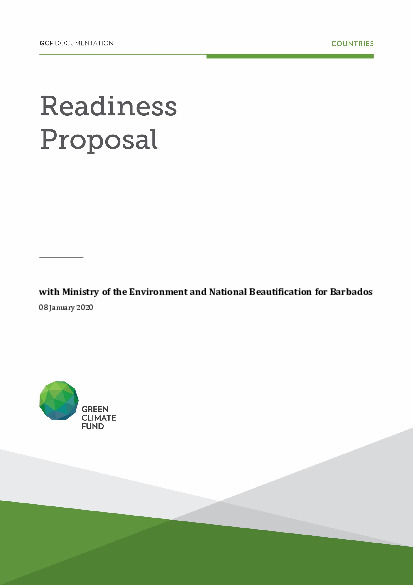R2RP Readiness
Barbados is a Small Island Developing State (SIDS) located in the broader Caribbean Region at coordinates 13N, 59W, approximately 160 km from the nearest landmass. Every year, between June and November, Barbados and the other countries in the region face the threat of hurricanes. In less than 12 hours, a small island in the Caribbean can lose in excess of 300 percent of its GDP (e.g. Grenada in 2004 & Dominica in 2017) or become completely uninhabitable (Barbuda in 2017). While Barbados has not received a direct hit from a hurricane since 1955, a $5 Billion (USD), tourism-dependent economy could be devastated by a single event. Climate change has exacerbated this risk. 2017 generated seventeen (17) named storms, six (6) of which were major hurricanes and two (2) of which were Category 5. Hurricane Irma, with maximum sustained wind speeds of 185 miles per hour (298 kilometers per hour), was the strongest hurricane ever recorded in the Atlantic. In addition to increased risk from extreme weather events, the latest report from the Intergovernmental Panel on Climate Change (IPCC) warns of the “slow onset” effects of sea level rise, rising sea temperatures and ocean acidification, predicting losses of 70-95 percent of coral reefs at 1.5 degrees Celsius of warming and 99 percent losses at 2 degrees. In addition to increasing the vulnerability of Barbados’ housing stock and essential services (e.g. the electrical grid) to extreme wind events and increasing the degradation of coral reefs, climate change has also worsened Barbados’ ability to meet the freshwater demand of its growing economy and population. Already designated as one of the most water scarce countries in the world, with an estimated total renewable water resources of 280 m3/person/year, Barbados now faces longer dry spells and increased droughts. With time, the rain that does fall will do so in shorter, more intense events, but the small island has little inherent water storage capacity either above or below ground.
As a response to these climate change challenges, the GOB launched the Roof to Reef Programme (R2RP). The R2RP provides the overarching framework that allows the integrated approach to addressing the negative impacts of climate change. The R2RP is the Government’s sustainable development model for the next decade and represents the country programme for Barbados. The primary focus is on improving the social and environmental circumstances of the people in Barbados. The R2RP will enhance the country’s ability to recover from climatic events. The R2RP is hinged on six thematic areas: Shelter, Water, Energy, Waste, Land use, and Ecosystems Management. The thematic areas under the R2RP are aligned to Barbados’ NDC priority areas.
